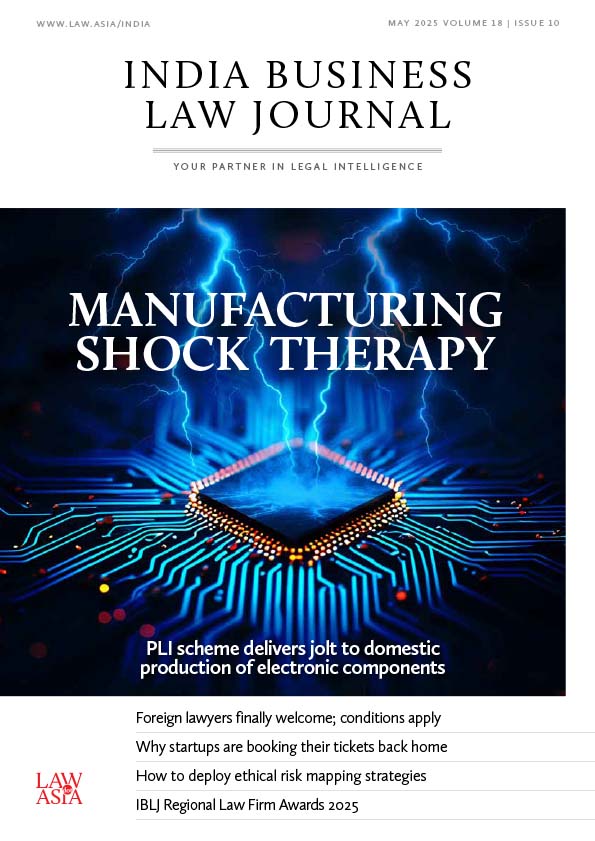India Business Law Journal – September 2023
Volume 17, Issue 3
If you are a subscriber, please sign in below.
You must be a
subscribersubscribersubscribersubscriber
to read this content, please
subscribesubscribesubscribesubscribe
today.
For group subscribers, please click here to access.
Interested in group subscription? Please contact us.
你需要登录去解锁本文内容。欢迎注册账号。如果想阅读月刊所有文章,欢迎成为我们的订阅会员成为我们的订阅会员。
Highlights:
- The green scheme: Creating and adapting regulation to support hub for production of green hydrogen
- SEBI seeks to simplify delisting process for companies
- Exploring law firm readiness to embrace technology
- Management professionals find greater role at firms
- Alliances underpin Asian in-house counsel bodies
Powering up
Green hydrogen a potent future source of clean energy
In mid-August this year, the Ministry of Power and New and Renewable Energy came out with a national green hydrogen standard that defined the emission threshold for the product to be termed “green”.
With the move, India became one of the few countries to develop such a definition. Green hydrogen plays a significant part in the country’s ambitions of becoming energy independent by 2047, and the government has stated its commitment to making the country a global leader in green hydrogen production.
Our Cover story explores India’s plans to develop its green hydrogen sector, which can help reduce carbon emissions and fossil fuel imports. Large oil and gas companies, and power producers such as Adani and Reliance Industries, are some of the main players in the sector committing billions of dollars to increasing green hydrogen production.
While retailing green hydrogen is a long way off, it is expected that the established players, which already have wide distribution networks across the country, will dominate this space. Consumers of green hydrogen are largely from infrastructure sectors such as cement, steel and shipping, and while India’s green hydrogen production expands so will the potential for global exports.
In Strength in numbers, we cover the dynamic landscape of Asia’s legal community, where the newer and younger organisations are feeling the need to cosey up to more established networking providers.
In India, the Federation of Indian Corporate Lawyers and the General Counsels’ Association have advocated for statutory recognition, with the latter focusing on strengthening its membership by industry representation rather than sheer numbers.
But as these associations navigate regional complexities, the focus continues to remain on collective advancement. The formation of Thailand’s first association for in-house counsel, the Thai Corporate Counsel Association (Thai-CCA), marks a significant step towards addressing know-ledge gaps and much-needed support for the sector in the country.
Just months into its founding, the Thai-CCA has aligned itself with the Asia-Pacific Corporate Counsel Alliance (APCCA) to learn from the more well-established body.
The APCCA itself has formed alliances with national associations in India, Indonesia, Malaysia, the Philippines, Singapore and Sri Lanka. Its secretary-general, Arlene Lapuz Ureta, wants the association to become a strong regional alliance of in-house counsel associations and play a role in harmonising laws across different jurisdictions. Our article sums up the latest developments in the region.
This issue’s Intelligence report looks at the market regulator’s proposal to allow fixed-price delisting of securities, which aligns with global norms and is expected to boost M&A activity and private investment in public equity.
The Securities and Exchange Board of India (SEBI) intends for listed companies to delist more easily by providing the option for fixed-price delisting as an alternative to the current reverse book-building method, under which the acquirer can provide an exit opportunity to public shareholders at a fixed price.
But despite the potential benefits, retaining the 90% delisting threshold may in fact hinder the mechanism’s success. Reducing the threshold to 75-90% could increase the chances of success, say lawyers. While the new mechanism will offer more certainty, it ultimately relies on market forces and shareholder decisions, and ongoing refinement is needed.
Vantage point in this issue looks at the greater role being accorded to law firm management professionals by clients. The legal market in India has witnessed increased interactions between domestic and foreign law firms, and a growing realisation of the need to align with international standards. Enter a special breed of management professionals who optimise existing resources and infrastructure.
Typically, these consultants work with functional support professionals at the firm such as human resources, information technology, finance, marketing and practice development.
They help set up the right processes and provide a supportive environment for growth so that lawyers can continue to concentrate on client engagement and other billable activities. While mostly large firms employ them, their importance is becoming noticed in the rest of the sector.
In What’s the deal, we look at law firms in India that are grappling with the challenges and opportunities presented by legal technology. Firms have felt the need to blend technology into their everyday operations, especially since covid-19. There is a general acceptance of implementing tech-based solutions, but resistance remains. The use of self-made and customised solutions such as PSL Assist and DDfact, made by the law firms themselves, illustrates the extent of this evolving landscape. Our article also explores where firms stand on AI and its usefulness in its current forms.
In this issue
Arbitration: reins tighten on judicial intervention
A fundamental principle of India’s arbitration law is to have limited judicial intervention in the process
RBI fines ICICI, Kotak Mahindra banks over breaches
RBI has imposed USD1 million and INR40 million penalties on ICICI Bank and Kotak Mahindra Bank, respectively, for violating regulatory norms
Delisting Roadblock?
SEBI’s fixed-price mechanism to face challenges as the 90% delisting threshold remains for companies
Tapping innate strengths
How management professionals can strengthen support functions at law firms
Strength in numbers
National in-house counsel bodies in Asia see wisdom in joining hands with resourceful larger counterparts
Loading legaltech
Our survey finds widescale acceptance of legaltech among firms, but some resistance remains
The green scheme
How regulating green hydrogen will play a big role in government plans for energy independence
































